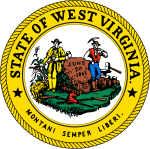2008 West Virginia Republican presidential caucuses and primary
 | |||||||||||||||||||||||||||||||||||||||||||||||
| |||||||||||||||||||||||||||||||||||||||||||||||
| |||||||||||||||||||||||||||||||||||||||||||||||
The 2008 West Virginia Republican presidential caucuses took place on February 5, 2008, to select 18 delegates to the 2008 Republican National Convention.[1] An additional nine delegates were selected in a primary election on May 13, 2008, for a total of 27 delegates to the national convention.[1] Mike Huckabee won the caucuses, and John McCain later won the primary.
Romney entered the caucus with the most pledged convention-goers, but delegates for McCain defected to Huckabee.[2] In the first round of caucusing, the results were Romney 464, Huckabee 375, McCain 176, Paul 118, Giuliani 0. Since no candidate had a majority, Giuliani dropped out and the delegates took a second vote. At this second vote, most Paul and McCain supporters, reportedly acting on commands from their coordinators, shifted to Huckabee, ensuring him the majority.[3] As a result of a deal with Huckabee's camp, Paul's delegates swung to Huckabee in exchange for 3 of the State's 18 national delegates.[4]
The West Virginia caucus was the first of the 21 "Super Tuesday" contests to be counted, with the results being reported in the mid-afternoon.[5] Huckabee's win over the favored Romney was considered a major loss of momentum for Romney's campaign, while it revitalized Mike Huckabee's hopes for the nomination.[6]
In the primary election, three delegates were awarded for each of West Virginia's three congressional districts. The winner in each district was awarded all three of that district's delegates.[7] McCain, the presumptive nominee, easily won all three districts.
Results
February 5 Caucus
| Candidate | Votes | Percentage | Delegates |
|---|---|---|---|
| Mike Huckabee | 567 | 51.55% | 18(15) |
| Mitt Romney | 521 | 47.36% | 0 |
| John McCain | 12 | 1.09% | 0 |
| Ron Paul | 0 | 0% | 0(3) |
| Total | 1,100 | 100% | 18 |
- As a result of the deal between Huckabee and Paul's delegates, 3 of the State's 18 delegates went to Ron Paul, although the election was technically a "winner-take-all."[4]
May 13 primary
| Candidate | Votes | Percentage | Delegates |
|---|---|---|---|
| John McCain | 89,683 | 76.0% | 9 |
| Mike Huckabee* | 12,175 | 10.3% | 0 |
| Ron Paul | 5,914 | 5.0% | 0 |
| Mitt Romney* | 5,188 | 4.4% | 0 |
| Rudolph Giuliani* | 2,831 | 2.4% | 0 |
| Alan Keyes | 1,427 | 1.2% | 0 |
| Others | 727 | 0.6% | 0 |
| Total | 117,945 | 100% | 9 |
*Candidate suspended campaign prior to this primary
See also
- Republican Party (United States) presidential primaries, 2008
- West Virginia Democratic primary, 2008
References
- ^ a b "West Virginia Republican Delegation 2008". The Green Papers. Retrieved January 28, 2008.
- ^ Huckabee wins all 18 W.Va. delegates
- ^ Jim Geraghty (February 25, 2008). "West Virginia Done, Huckabee Wins (UPDATED)". National Review. Archived from the original on February 7, 2008. Retrieved February 5, 2008.
- ^ a b Rhee, Foon (February 5, 2008). "Paul claims delegates in West Virginia". boston.com.
- ^ POLITICO: Romney Loses West Virginia!
- ^ Tapper, Jake (February 5, 2008). "Hucka-Back from the Dead". ABC News.
- ^ a b "West Virginia Nominating Contest Results". The New York Times. February 5, 2008. Retrieved January 10, 2009.
- ^ "Caucus Results". CNN. February 5, 2008. Retrieved February 5, 2008.

















